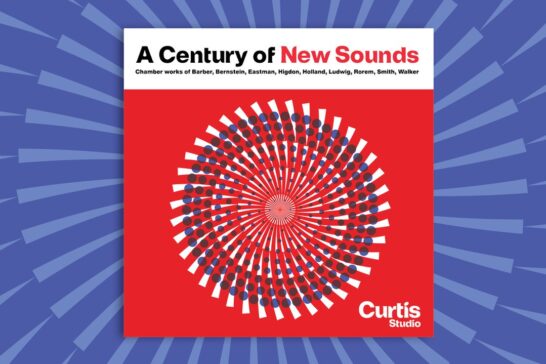Curtis Symphony Orchestra Presents “Ra, Mackey, and Tchaikovsky” on March 9

Press Contacts:
Patricia K. Johnson | patricia.johnson@curtis.edu | (215) 717-3190
Ryan Scott Lathan | ryan.lathan@curtis.edu | (215) 717-3145
Download PDF
PHILADELPHIA, PA—February 21, 2024—The Curtis Symphony Orchestra returns to Verizon Hall at the Kimmel Center for the final concert of its bold and ambitious 2023–24 series on Saturday, March 9, at 3 p.m. with “Ra, Mackey, and Tchaikovsky.” Internationally renowned conductor Robert Spano (’85), newly appointed music director designate of Washington National Opera and current music director of the Fort Worth Symphony Orchestra and the Aspen Music Festival, leads Curtis’s talented young musicians in a remarkable program featuring two exhilarating world premieres and a late-Romantic era classic.
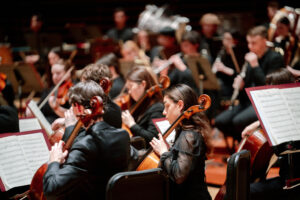 The afternoon opens with Te Deum, an exciting, newly commissioned work by James Ra (’04). Praised by the Philadelphia Inquirer as “a composer to watch,” Mr. Ra’s compositions have been described as “coursing with adrenaline-pumping energy” (Star Ledger). Written during the COVID-19 pandemic and based on the Latin hymn, Te Deum has been described by the composer as an “introspective, deeply personal prayer and hymn of praise, thanksgiving, and awe in solitude.” Using one of his mother’s favorite hymns, “Great is Thy Faithfulness,” as the vessel through which all of the music emerges, this powerful orchestral work is “an ode to the innocence, simplicity, and sincerity of a time lost.”
The afternoon opens with Te Deum, an exciting, newly commissioned work by James Ra (’04). Praised by the Philadelphia Inquirer as “a composer to watch,” Mr. Ra’s compositions have been described as “coursing with adrenaline-pumping energy” (Star Ledger). Written during the COVID-19 pandemic and based on the Latin hymn, Te Deum has been described by the composer as an “introspective, deeply personal prayer and hymn of praise, thanksgiving, and awe in solitude.” Using one of his mother’s favorite hymns, “Great is Thy Faithfulness,” as the vessel through which all of the music emerges, this powerful orchestral work is “an ode to the innocence, simplicity, and sincerity of a time lost.”
The program continues with the world premiere of GRAMMY Award-winning Curtis composition faculty member Steven Mackey’s Aluminum Flowers, a concerto for solo electric guitar and orchestra. This eagerly anticipated new work features the jaw-dropping virtuosity of polymath guitarist and acclaimed Curtis alumna JIJI (’15), praised by the Washington Post as “one of the 21 composers/performers who sound like tomorrow.” Aluminum Flowers traces the history of the guitar from the 600-year-old Spanish vihuela to contemporary pop, rock, blues, and jazz electric styles.
 Speaking on the guitar concerto, Mackey shared: “The classical guitar is the most ridiculously soft instrument. The best place to listen to the classical guitar is playing it, so we need to amplify that detail. With the third movement of Aluminum Flowers, the starting point was my appreciation of the sound of Carlos Santana and his singing tone. There’s this one tune, in particular, Samba Pa’ Ti. In Aluminum Flowers, the [Santana-esque tune] is amplified and distorted lyrically. The first movement is classical guitar. The second movement has this delay pedal that the guitarist has to keep up with. The fourth movement uses a crazy [prepared] guitar that I invented!”
Speaking on the guitar concerto, Mackey shared: “The classical guitar is the most ridiculously soft instrument. The best place to listen to the classical guitar is playing it, so we need to amplify that detail. With the third movement of Aluminum Flowers, the starting point was my appreciation of the sound of Carlos Santana and his singing tone. There’s this one tune, in particular, Samba Pa’ Ti. In Aluminum Flowers, the [Santana-esque tune] is amplified and distorted lyrically. The first movement is classical guitar. The second movement has this delay pedal that the guitarist has to keep up with. The fourth movement uses a crazy [prepared] guitar that I invented!”
In his program notes, Mackey writes that Aluminum Flowers is a piece that celebrates the idea of “polymath guitarists.” He elaborates, “I think of the term polymath as someone who has mastered several disciplines. Guitarists, more than other instrumentalists, tend to do that. The nylon string classical guitar is conceived of as a polyphonic instrument. This is really a different instrument than the electric guitar, which has no resonating body and is more like the organ. Without pulling the stops to engage the pipes, there’s no sound. Similarly, the electric guitar, without effects pedals and an amplifier, really has nothing to offer.”
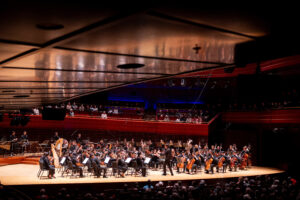 The afternoon concludes with Pyotr Ilyich Tchaikovsky’s impassioned, intensely personal Symphony No. 6 in B minor, Op. 74 (“Pathétique”). Composed in the final year of his life—in the ever-rippling wake of a traumatic marriage years earlier, as he continued to grapple with depression, artistic self-doubt, and societal pressures regarding his sexual orientation—this turbulent work captures the Russian Romantic composer’s psychological turmoil and disillusionment with life right before his physical health began to suddenly decline. Subtitled “Patetitčeskaja,” or “passionate” in English, at the suggestion of his brother Modest and dedicated to his nephew Bob Davydov, the symphony premiered in St. Peterburg on October 28, 1893, only nine days before Tchaikovsky’s mysterious death at age 53. In numerous letter correspondences, he deemed it “the best thing I ever composed or shall compose,” an emotional symphony enrobed in shadows—brooding, euphoric, tense, and frighteningly explosive—yet conceived and delivered to the world without the knowledge that his death would follow mere days after he conducted its first performance. The invisible force of Fate that had relentlessly pursued his Fourth and Fifth symphonies is met head-on here in his Sixth, with an unexpectedly solemn finale that defies nineteenth-century conventions and forgoes orchestral pyrotechnics as the steady heartbeat in the low double basses slows, and the audience is left with nothing but silence.
The afternoon concludes with Pyotr Ilyich Tchaikovsky’s impassioned, intensely personal Symphony No. 6 in B minor, Op. 74 (“Pathétique”). Composed in the final year of his life—in the ever-rippling wake of a traumatic marriage years earlier, as he continued to grapple with depression, artistic self-doubt, and societal pressures regarding his sexual orientation—this turbulent work captures the Russian Romantic composer’s psychological turmoil and disillusionment with life right before his physical health began to suddenly decline. Subtitled “Patetitčeskaja,” or “passionate” in English, at the suggestion of his brother Modest and dedicated to his nephew Bob Davydov, the symphony premiered in St. Peterburg on October 28, 1893, only nine days before Tchaikovsky’s mysterious death at age 53. In numerous letter correspondences, he deemed it “the best thing I ever composed or shall compose,” an emotional symphony enrobed in shadows—brooding, euphoric, tense, and frighteningly explosive—yet conceived and delivered to the world without the knowledge that his death would follow mere days after he conducted its first performance. The invisible force of Fate that had relentlessly pursued his Fourth and Fifth symphonies is met head-on here in his Sixth, with an unexpectedly solemn finale that defies nineteenth-century conventions and forgoes orchestral pyrotechnics as the steady heartbeat in the low double basses slows, and the audience is left with nothing but silence.
Single tickets for “Ra, Mackey, and Tchaikovsky” start at $19 and are available for purchase at Curtis.edu. The flexible Choose Your Own subscription option offers 25% off ticket prices when purchasing tickets to two or more performances. To order a subscription, visit Curtis.edu/Subscribe, call (215) 893-7902, or email tickets@curtis.edu. To learn more about the remaining performances in Curtis’s 2023–24 season, including the Curtis Opera Theatre, Ensemble 20/21 concerts, Curtis Recital Series, and more, visit Curtis.edu/Calendar.
Curtis Symphony Orchestra
The Jack Wolgin Orchestral Concerts
Ra, Mackey, and Tchaikovsky
Saturday, March 9 at 3:00 p.m.
Verizon Hall at the Kimmel Center; Broad and Spruce Streets, Philadelphia
Robert Spano (’85), conductor
Curtis Symphony Orchestra
| JAMES RA (’04) | Te Deum (world premiere) | |
| STEVEN MACKEY | Aluminum Flowers, for solo electric guitar and orchestra (world premiere) | |
| PYOTR ILYICH TCHAIKOVSKY | Symphony No. 6 in B minor, Op. 74 (“Pathétique”) |
Orchestral concerts are supported by the Jack Wolgin Curtis Orchestral Concerts Endowment Fund.
About the Artists
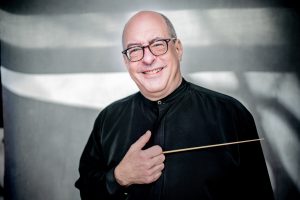 Robert Spano (Conducting ’85)—conductor, pianist, composer, and teacher—is known worldwide for the intensity of his artistry and distinctive communicative abilities, creating a sense of inclusion and warmth among musicians and audiences that is unique among American orchestras. After twenty seasons as music director, he continues his association with the Atlanta Symphony Orchestra as music director laureate. An avid mentor to rising artists, he is responsible for nurturing the careers of numerous celebrated composers, conductors, and performers. As music director of the Aspen Music Festival and School since 2011, he oversees the programming of more than 300 events and educational programs for 630 students and young performers. Principal guest conductor of the Fort Worth Symphony Orchestra since 2019, Spano began his tenure as music director in August 2022, and will continue there through the 2027–28 season. He is the tenth music director in the orchestra’s history, which was founded in 1912. In February 2024, Spano was appointed music director of the Washington National Opera, beginning in the 2025–26 season, for a three-year term; he is currently the WNO’s music director designate.
Robert Spano (Conducting ’85)—conductor, pianist, composer, and teacher—is known worldwide for the intensity of his artistry and distinctive communicative abilities, creating a sense of inclusion and warmth among musicians and audiences that is unique among American orchestras. After twenty seasons as music director, he continues his association with the Atlanta Symphony Orchestra as music director laureate. An avid mentor to rising artists, he is responsible for nurturing the careers of numerous celebrated composers, conductors, and performers. As music director of the Aspen Music Festival and School since 2011, he oversees the programming of more than 300 events and educational programs for 630 students and young performers. Principal guest conductor of the Fort Worth Symphony Orchestra since 2019, Spano began his tenure as music director in August 2022, and will continue there through the 2027–28 season. He is the tenth music director in the orchestra’s history, which was founded in 1912. In February 2024, Spano was appointed music director of the Washington National Opera, beginning in the 2025–26 season, for a three-year term; he is currently the WNO’s music director designate.
During the 2023–24 season, Spano leads the Fort Worth Symphony symphonic and chamber music programs, as well as a gala concert with Renée Fleming and Rod Gilfry, in addition to overseeing the orchestra and music staff and shaping the artistic direction of the orchestra and driving its continued growth. Additional engagements this season include the Atlanta and New Jersey Symphonies; Denver, Naples, and Rhode Island philharmonics; multiple weeks at Curtis and Rice University; and a recital in Napa with Kelley O’Connor.
Spano made his Metropolitan Opera debut in 2019, leading the U.S. premiere of Marnie, by American composer Nico Muhly. Recent concert highlights have included several world premiere performances, including Voy a Dormir by Bryce Dessner at Carnegie Hall with the Orchestra of St. Luke’s and mezzo-soprano Kelley O’Connor; George Tsontakis’s Violin Concerto No. 3 with the Dallas Symphony Orchestra; and the Tuba Concerto by Jennifer Higdon, performed by Craig Knox and the Pittsburgh Symphony.
With a discography of recordings for Telarc, Deutsche Grammophon, and ASO Media, Mr. Spano has garnered four GRAMMY Awards and eight nominations with the Atlanta Symphony Orchestra. He is on faculty at Oberlin Conservatory and has received honorary doctorates from Bowling Green State University, the Curtis Institute of Music, Emory University, and Oberlin. Maestro Spano is a recipient of the Georgia Governor’s Award for the Arts and Humanities and is one of two classical musicians inducted into the Georgia Music Hall of Fame.
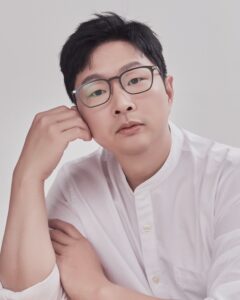 James Ra’s music has been described as “coursing with adrenaline-pumping energy.” In Japan, when the Curtis Chamber Orchestra took his Concerto Grosso No. 1 on tour, they wrote: “the Concerto Grosso No. 1 had a tremendous impact on the audience. Its themes of love, life, and death were dramatically expressed.” This work subsequently aired on National Public Radio. The Philadelphia Inquirer has called him “a composer to watch.”
James Ra’s music has been described as “coursing with adrenaline-pumping energy.” In Japan, when the Curtis Chamber Orchestra took his Concerto Grosso No. 1 on tour, they wrote: “the Concerto Grosso No. 1 had a tremendous impact on the audience. Its themes of love, life, and death were dramatically expressed.” This work subsequently aired on National Public Radio. The Philadelphia Inquirer has called him “a composer to watch.”
He has received commissions and performances from many recognized artists such as Soovin Kim, Ju Young Baek, Julius Jeongwon Kim, Dami Kim, Patrick Jee, Michelle Kim, Jooyoung Oh and the Arditti Quartet among many others. His music has been performed by various members of the Philadelphia Orchestra, New York Philharmonic, Cleveland Orchestra, Boston Symphony, Baltimore Symphony, and Seoul Philharmonic in such venues as Carnegie Hall, Verizon Hall, New Jersey Performing Arts Center, Philadelphia Convention Center, Jordan Hall, Weill Hall, the Kaufmann Center, Herbst Theatre in San Francisco, Seoul Arts Hall, IBK Hall in Seoul, Arts Hall in Busan, Daejeon Arts Hall, Tong Yeong International Music Festival, as well as in France, India, and Turkey. His music has been recorded on the Stomp (EMI), Urtext and Sony labels (Sony Korea). Upcoming commissions include a double concerto for the New York Classical Players, an orchestral work for the New Jersey Youth Orchestra, a work for the New York Flutists, a saxophone work for Wonki Lee, and a cello work for Jiwon Suh.
He was the young composer-in-residence at Music From Angel Fire under the direction of Ida Kavafian and composer-in-residence for groups such as the Korean Concert Society in Washington, D.C.; Ensemble 212 in New York; and currently Ensemble V9 in Korea. He has been a fellow at Princeton University as part of their Atelier under the direction of Toni Morrison.
Ra is the recipient of a MacDowell residency, the International NPSS Composition Concours Grand Prize, the Manhattan Prize, the Franklin & Marshall College Composition Prize, the Louisa Knapp Fellowship, the John Brenton Fellowship, a scholarship to the Aspen Music Festival, a fellowship at the Academy of Villecroze, and was a winner of the New Jersey Symphony Composition & Conducting Institute Competition.
Born in Upper Darby, Pennsylvania, his teachers include Richard Danielpour, Ned Rorem, George Tsontakis and John Carbon, Simon Andrews, and Seung Jae Chung. He holds degrees from Franklin and Marshall College (B.M.), the Curtis Institute of Music (diploma), and the Manhattan School of Music (M.M. and D.M.A.).
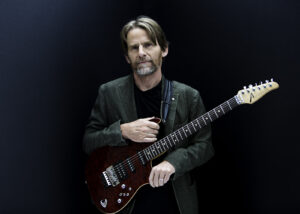
Bright in coloring, ecstatic in inventiveness, lively and profound, Steven Mackey’s music spins the tendrils of his improvisatory riffs into large-scale works of grooving, dramatic coherence. As a teenager growing up in Northern California obsessed with blues-rock guitar, Mackey was in search of the “right wrong notes,” those heart-wrenching moments that imbue the music with new, unexpected momentum. Today, his pieces play with that tension of being inside or outside of the harmony and flow forward, shimmering with prismatic detail.
Signature early works merged his academic training with the free-spirited physicality of his mother-tongue rock guitar music: Troubadour Songs (1991) and Physical Property (1992) for string quartet and electric guitar; and Banana/Dump Truck (1995), an electrified-cello concerto. Later works explored his deepening fascination with transformation and movement of sound through time: Dreamhouse (2003), a rich work for voices and ensemble, was nominated for four GRAMMY awards; A Beautiful Passing (2008) for violin and orchestra on the passing of his mother; and Slide (2011), a GRAMMY Award-winning music theater piece.
Mackey further expanded his theatrical catalog with his short chamber opera Moon Tea about the 1969 meeting between the Apollo 11 astronauts and the Royal Family, premiered by Opera Theatre of Saint Louis in 2021. Other world premieres in 2021 included Shivaree, a trumpet fantasy featuring soloist Thomas Hooten, who premiered the work with the LA Philharmonic and Gustavo Dudamel.
Today, Steven Mackey writes for chamber ensemble, orchestra, dance, and opera—commissioned by the greatest orchestras around the world. He has served as professor of music at Princeton University for the past 35 years and has won several awards from the American Academy of Arts and Letters, a Guggenheim Fellowship, and a Kennedy Center Friedheim Award. He continues to explore an ever-widening world of timbres befitting a complex, 21st-century culture while always striving to make music that unites the head and heart, that is visceral, that gets us moving. Dr. Mackey joined the Curtis faculty in 2022.
Praised by The Washington Post for her “mesmerizing” and “stirring” performances, JIJI is an adventurous guitarist known for her virtuosity and command of diverse repertoire. Equally at home with both acoustic and electric guitar, her concert programs range from traditional and contemporary classical to free improvisation.
 Through her impeccable musicianship, compelling stage presence, and commitment to commissioning and performing new musical works, JIJI has solidified her reputation as a top 21st century guitarist. In 2021, The Washington Post selected JIJI as “one of the 21 composers/performers who sound like tomorrow,” and The Kansas City Star recently described her as “a graceful and nuanced player.” In recent seasons, JIJI has presented solo recitals at Carnegie Hall’s Weill Recital Hall; Lincoln Center; 92nd Street Y; Caramoor; Green Music Center; and the National Art Gallery, among other distinguished venues. Her performances have been featured on PBS (On Stage at Curtis), NPR’s From the Top, WHYY-TV, FOX 4-TV, Munchies (the Vice Channel), The Not So Late Show (Channel 6, Kansas), and Hong Kong broadcast station RTHK’s The Works. In 2016, she became the first guitarist in 30 years to secure first prize in the Concert Artists Guild Competition.
Through her impeccable musicianship, compelling stage presence, and commitment to commissioning and performing new musical works, JIJI has solidified her reputation as a top 21st century guitarist. In 2021, The Washington Post selected JIJI as “one of the 21 composers/performers who sound like tomorrow,” and The Kansas City Star recently described her as “a graceful and nuanced player.” In recent seasons, JIJI has presented solo recitals at Carnegie Hall’s Weill Recital Hall; Lincoln Center; 92nd Street Y; Caramoor; Green Music Center; and the National Art Gallery, among other distinguished venues. Her performances have been featured on PBS (On Stage at Curtis), NPR’s From the Top, WHYY-TV, FOX 4-TV, Munchies (the Vice Channel), The Not So Late Show (Channel 6, Kansas), and Hong Kong broadcast station RTHK’s The Works. In 2016, she became the first guitarist in 30 years to secure first prize in the Concert Artists Guild Competition.
In 2023–2024, JIJI gives the world premiere of Steven Mackey’s Concerto for Electric Guitar with Robert Spano and the Curtis Orchestra, appears with the Los Angeles Chamber Orchestra and the Asheville and Utah Symphonies, is presented in recital by the Austin Classical Guitar Society, Tippet Rise Arts Center, Placitas Artists Series, Celebrity Series of Boston, and La Jolla Music Society, and tours with violinist Danbi Um in Delaware, Houston, Halifax, New Hampshire, Ohio, Wisconsin.
JIJI has premiered solo and chamber works by a diverse range of musical artists, including Michael Gilbertson, Hilary Purrington, Shelley Washington, Kate Moore, Chris Rountree, Gulli Bjornsson, Molly Joyce, and Paul Lansky. In 2023, JIJI will release UNBOUND, the culmination of a multiyear commissioning and recording project. A sought-after and versatile collaborator, JIJI’s recent chamber and ensemble performances include appearances with the New York Philharmonic’s Nightcap Series; Cuarteto Latinoamericano; the Verona Quartet; Wildup; Duo Linu; and soprano Molly Netter, among others. During the 2022–23 season, JIJI will make her San Francisco Performances debut at Herbst Theater.
A committed educator, JIJI is Associate Professor of Music in Guitar at Indiana University Jacobs School of Music and former Assistant Professor of Guitar at Arizona State University’s School of Music, Dance and Theater. She has presented master classes and workshops extensively, including at the Peabody Institute, Eastman School of Music, Yale University, and Dublin’s National Concert Hall, among many others. She is sponsored by D’Addario Strings and GuitarLift by Felix Justen.
Acclaimed for its “otherworldly ensemble and professional level of sophistication” (New York Times), the Curtis Symphony Orchestra offers a dynamic showcase of tomorrow’s exceptional young talent. Each year the 100 extraordinary musicians of the orchestra work with internationally renowned conductors, including Osmo Vänskä, Vladimir Jurowski, Marin Alsop, Simon Rattle, Robert Spano, and Yannick Nézet-Séguin, who also mentors the early-career conductors who hold Rita E. Hauser Conducting Fellowships. This professional training has enabled Curtis alumni to assume prominent positions in America’s leading orchestras, as well as esteemed orchestral, opera, and chamber ensembles around the world.
About the Curtis Institute of Music
At Curtis, the world’s most talented young musicians develop into exceptional artists, creators, and innovators. With a tuition-free foundation, Curtis is a unique environment for teaching and learning. A small school by design, students realize their artistic potential through intensive, individualized study with the most renowned, sought-after faculty. Animated by a learn-by-doing philosophy, Curtis students share their music with audiences through more than 100 performances each year, including solo and chamber recitals, orchestral concerts, and opera—all free or at an affordable cost—offering audiences unique opportunities to participate in pivotal moments in these young musicians’ careers. Curtis students experience a close connection to the greatest artists and organizations in classical music, and innovative initiatives that integrate new technologies and encourage entrepreneurship—all within a historic campus in the heart of culturally rich Philadelphia. In this diverse, collaborative community, Curtis’s extraordinary artists challenge, support, and inspire one another—continuing an unparalleled 100-year legacy of musicians who have led, and will lead, classical music into a thriving, equitable, and multidimensional future. Learn more at Curtis.edu.
Photos of the Curtis Symphony Orchestra courtesy of Margo Reed. Photos of JIJI by Marty Bra. Photo of Robert Spano by Jason Thrasher. Photo of James Ra courtesy of the artist. Photo of Steven Mackey courtesy of the artist.
# # #
